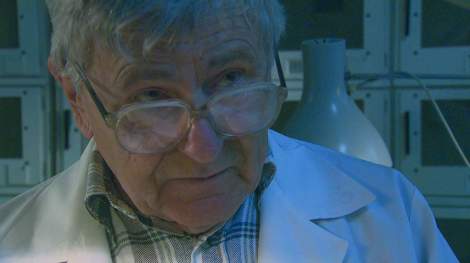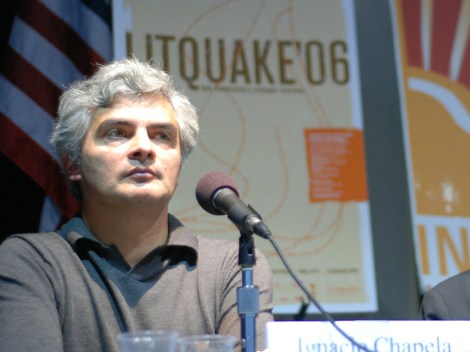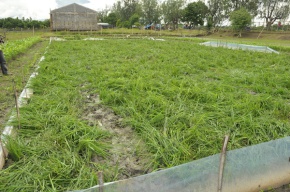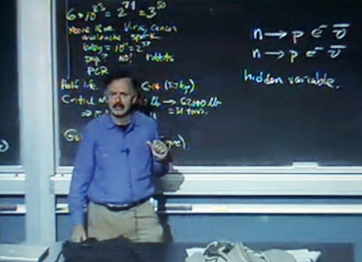When a study came out in 2012 associating gruesomely lumpy rats with genetically modified food, critics trashed it so thoroughly that a group of researchers and advocates called foul. This went beyond legitimate scientific critique, they wrote. It was evidence that “those with a vested interest attempt to sow unreasonable doubt around inconvenient results.”
More recently, a long-term GM feeding trial of pigs received a similar (though milder) treatment. Tom Laskawy here at Grist made the point that, though this study had flaws, the dismissals seemed knee-jerk — ideological rather than thoughtful.
So is there an echelon of corporate Pinkertons pouncing on any scientist who dares to dissent from the GM consensus? Are researchers who raise doubts about GMOs unfairly punished? It’s hard to assess while smoke billows and rhetorical bullets fly. It’s much easier to judge with the clarity of hindsight. The historical picture is sharper and simpler, and I think it really does show that scientists who step out of line on this issue are savaged in a manner that’s out of all proportion to their errors. These errors are real, but they should be exposed in the spirit of collaboration rather than castigation.
Back in 1998, Arpad Pusztai was just beginning his third year of research on the safety of transgenic potatoes when a TV program asked him to do an interview about his preliminary results.

Arpad Pusztai.
A Cold War defector to Britain from Hungary, Pusztai was a world expert on lectins — naturally occurring proteins that provide plants with a measure of pest resistance. Scientists had added genes for lectin production to potatoes, and Pusztai was feeding these potatoes to rats to test for adverse effects. He’d become more concerned when he saw that the rats he’d fed with transgenic potatoes were slightly smaller, and had less-reactive immune cells, than the others. (In the end, after statistical analysis, the only real difference was a slight change in gut cells.)
All these years later, we know what happened. The lectins themselves probably weren’t hurting the rats: Pusztai had cleverly designed his experiment with a control group of rats that ate non-transgenic potatoes plus a pure dose of lectin, so the problem (if there was a problem at all), was some unknown element of the transgenic potatoes. It seemed obvious to point to genetic engineering itself; that would be the only other difference, right?
Actually, no. We’ve come to understand that the DNA differences between two potatoes in a field are usually more significant than the difference between a parent plant and its genetically modified progeny. The comparison you’d want to make to test the effect of genetic engineering would be a transgenic plant versus its unmodified clone. And you’d want to make sure that these plants grow side by side, because we know that plants alter their gene expression in response to weather, soil, and history. Plants can even turn on genes to produce natural pesticides when afflicted by insects.
When you taste the terroir in wine, it’s not just the soil’s effect on the grape, it’s also the grape’s epigenetic response. In a very real way what you’re tasting is not just cause and effect, but a conversation. You’re tasting a complex dialogue between the grape and the mineral soil beneath it, the quality of sunshine on its leaves, the hand of the vintner. All of these factors can create genetic shifts more profound than a gene inserted by a scientist. And any of these changes might provoke a slight reaction in gut cells.
Back in 1998, however, people didn’t really understand any of this. So when Pusztai looked at his underweight rats, he attributed the cause to the one difference staring him in the face: genetic engineering. And, as Peter Pringle recounts in Food, Inc., he said as much on TV.
The TV presenter asked the obvious question: “So if genetically altered food can affect rats in this way, could they possibly have long term effects in humans too?” Pusztai was cornered. He could have replied that it was far too early for such a judgment and that he would not want to comment until his work had been peer reviewed. Instead he said that he would not eat genetically modified foods if he could help it, until there was more evidence about their safety. And then he added a bombshell: “It’s very unfair to use our fellow citizens as guinea pigs.”
All hell broke lose. The telephone lines running to the Rowett Institute, where Pusztai worked, jammed with calls from activists, government ministers, and industry heavyweights. Scientists began to pick apart Pusztai’s techniques. The media wallowed happily in the mess. There were rumors that the command had come down from the White House, to Downing Street, to the Rowett Institute, to smother the frenzy. The director of the Institute, facing “a megacrisis we didn’t remotely anticipate,” sealed Pusztai’s lab, confiscated his notebooks, and forbade him from further communication with the press. And, though the director had given Pusztai permission to speak about the preliminary results on TV and offered congratulations immediately afterward, once the frenzy started he put Pusztai on indefinite leave.
Let’s pause here for a moment to consider how this looks. Suppose you were the director of the Rowett Institute: If you wanted to inflame fears about GM food, would there be any better way to do it than shutting down suspicious research before it’s finished and firing the researcher? A group of scientists rallied to support Pusztai, writing: “Those of us who have known Dr. Pusztai’s work or have collaborated with him were shocked by the harshness of his treatment.”

Gordon WattStained glass at the University of Aberdeen celebrating the Rowett Institute.
Here’s what might have happened under less volatile conditions: Pusztai would have gone on to (um) finish his experiments, and, after peer review, would have come to more tempered conclusions. (Even under the actual, high-pressure conditions, the paper, eventually published in The Lancet, had much more modest findings.) Other scientists would have made their critiques, and Pusztai would have eventually zeroed in on the real cause of the problems. Everyone, including the biotech industry, would have come out ahead.
Instead, this affair effectively ended Pusztai’s career, and it polarized the debate. Even plant geneticist and prominent GM food supporter Nina Fedoroff (who wrote this excellent analysis of the affair, delving much more deeply than I have into the science) thought Pusztai’s treatment was inappropriate. “The whole thing was badly botched,” she emailed.
The botching continued. Ignacio Chapela, a UC Berkeley professor and author of a controversial paper suggesting that transgenic genes were mingling with traditional varieties, was denied tenure shortly after the university signed a $25 million sponsorship agreement with the agribusiness company Novartis (now Syngenta). A group of independent professors, invited by UC Berkeley to assess the situation, concluded that “there is little doubt” that the Berkeley-Novartis deal was partially to blame.
Lawrence Busch, a professor of sociology at Michigan State University, who led this review, said the sponsorship “played a very clear role and an unsatisfactory role in the tenure process.” (Chapela eventually did receive tenure.)

Steve Rhodes Ignacio Chapela
Science writer Emily Waltz has catalogued other examples of what looks like overreaction to research suggesting problems with genetically engineered crops. Much of the criticism is legitimate (if ferocious) scientific exchange. But some of it is probably orchestrated by industry. There’s evidence that the Bivings Group, a PR firm, spread false information about Chapela using pseudonyms on an Internet forum for scientists. And we know that Syngenta has stooped to ad hominem attacks.
You could say the same and more about activists campaigning against biotech: Anti-GMO trolls relentlessly bully and defame scientists, while spreading misinformation. Groups of thugs, like those that trampled a plot of Golden Rice recently, try to stop experiments. Swiss researchers running recent GM trials spent 78 percent of their research funds on security.
But there’s a crucial difference: Anti-GMO activists aren’t in positions of power. The Golden Rice experiments, unlike Pusztai’s, will be completed. I haven’t found any example of a scientist losing her job for a finding that’s favorable to biotech.

DA-RFU 5 Public Information UnitTrampled Golden Rice plot
I’m not saying we should smother criticism of science, or give a pass to studies that suggest there’s a problem with GM food. I’m all for thoughtful critiques, just not knee-breaking. It’s possible to assess unexpected new findings skeptically in the larger context of the existing corpus of science without setting phasers on utter destruction.
For instance, the study comparing pigs given conventional and GM feed exactly repeated Pusztai’s error. (The researchers said they couldn’t get genetic matches to GM feed because of intellectual property restrictions, but they could have partnered with any researcher at a university in the United States, which have permission to study patented seeds.) And when long-term feeding trials are done so as to compare apples to apples, they’ve reinforced the conclusion that genetically modified foods are safe. Stating these points is an appropriate response. And that’s the response most scientists have made.

Richard Muller.
Given the power of corporate influence, however, I think it’s also appropriate to provide extra shelter and support for legitimate scientists with unpopular views. This is one way in which climate science is very different from genetic engineering: Reasonable climate skeptics, like Richard Muller and his team, have been given the space to check their theories and — rather than being hounded and radicalized — they’ve generated data that changed their minds and resulted in a stronger consensus.
Here’s a proposal for putting this into practice: Why not fund a team of scientists with concerns about GM foods to address popular fears under open, rigorous conditions? Instead of having top-flight pro-GM scientists attack the studies after publication, it would make a lot more sense to have some of these people on the team from the beginning, helping to design the experiments. Whatever the results, science could only win.
More in this series:
- The genetically modified food debate: Where do we begin?
- The GM safety dance: What’s rule and what’s real
- Genetic engineering vs. natural breeding: What’s the difference?
- Is nature a cradle or a battlefield?
- Genetically engineered food: Allergic to regulations?
- Genetically modified seed research: What’s locked and what isn’t
- Genetically modified literature (in which I read books so you don’t have to)
- Food for bots: Distinguishing the novel from the knee-jerk in the GMO debate




